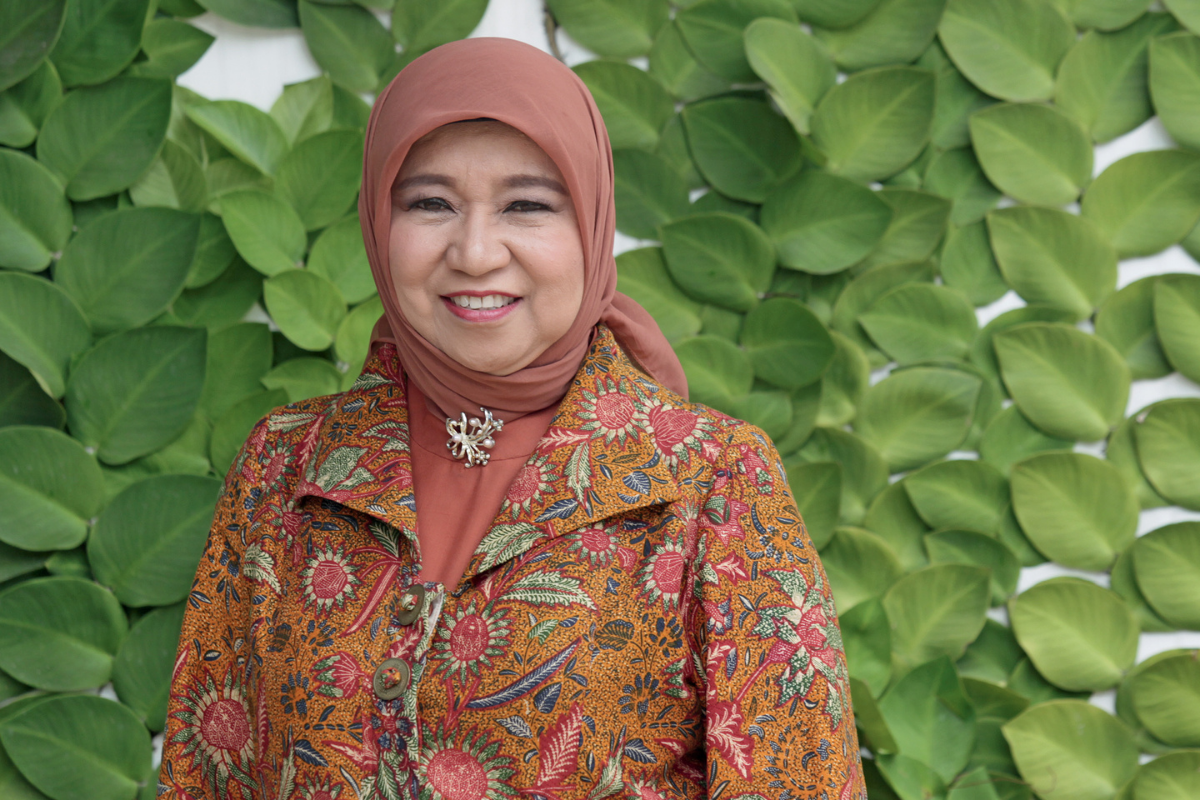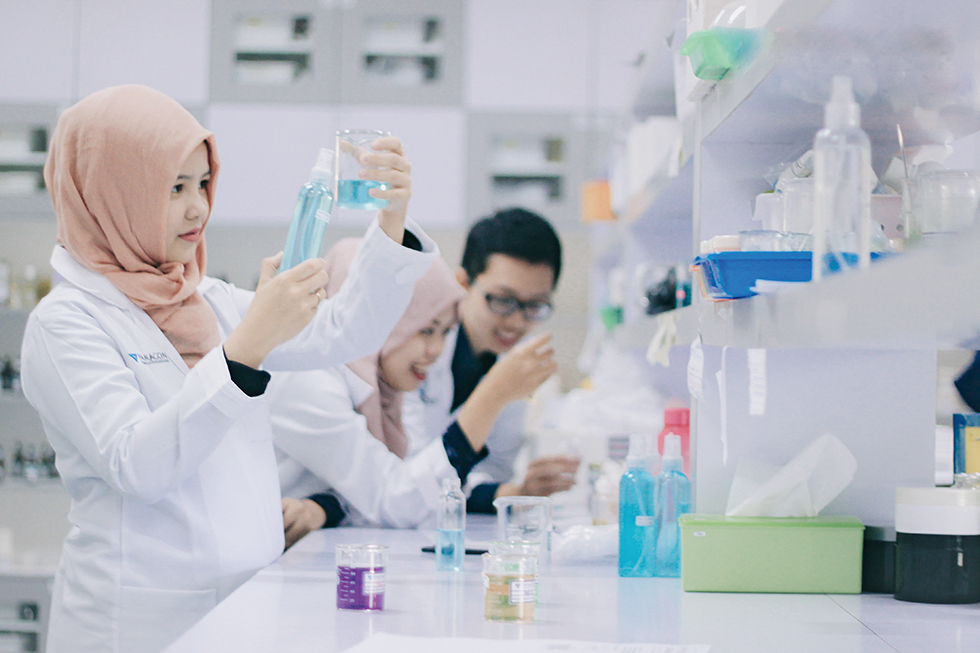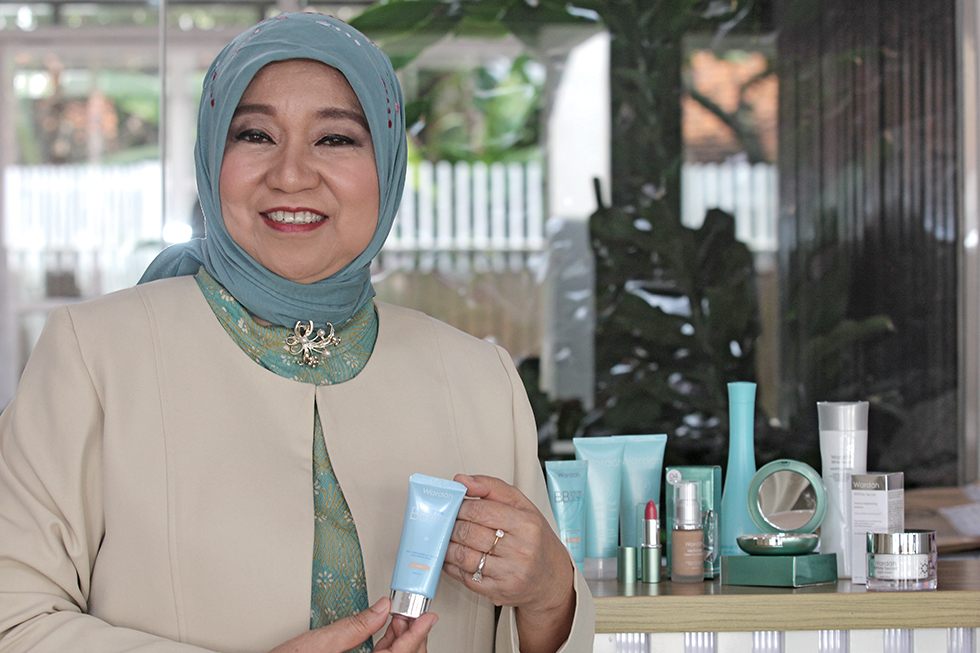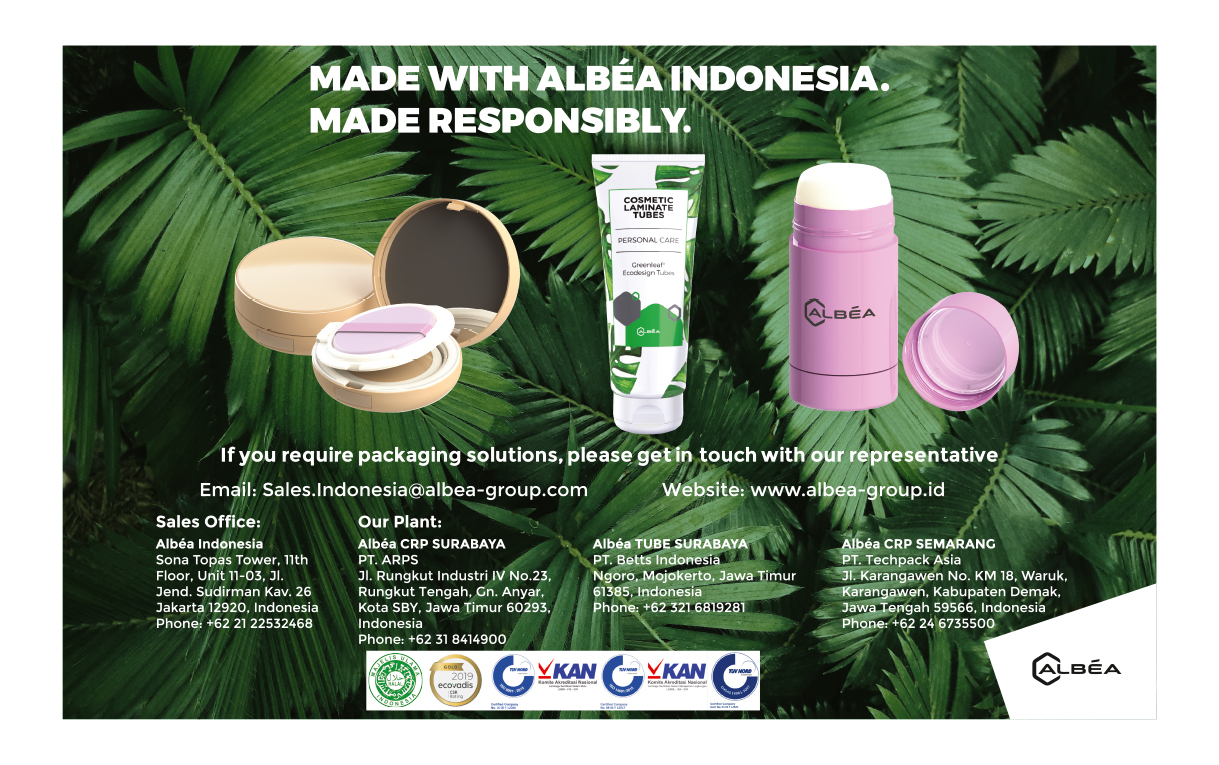Language is no barrier when it comes to having a chat with Nurhayati Subakat. There’s no doubting the communication as you sense nothing is lost in translation. You can feel this woman’s passion, hear the smile in her voice as she explains in Indonesian her commitment to Paragon Technology and Innovation, the company she founded in her garage 35 years ago.

Today, Nurhayati is rated among the top 20 female CEOs in Asia, a position well deserved considering the entrepreneur spearheads one of the country’s largest national cosmetics companies, employing more than 10,000 across 45 sites, including three factories, to produce leading make-up and skincare brands such as Wardah, Make Over, Emina and Putri.
Every six seconds, one of Paragon’s 95 million products is sold in Malaysia and Indonesia to women of all ages. Nurhayati admits she’s one of those avid consumers. “Even if I know I’m only spending the day in my home office, I put my make-up on,” she says.
“It just always feels good.” Nurhayati began her career as a pharmacist at Padang General Hospital before relocating to Jakarta to work in quality control for cosmetics company Wella.
But after too many nights returning home late from work and recalling her mother’s advice to incorporate family life with working from home, she decided to use her scientific background to make her own products.
With the help of her chemical engineer husband, Subakat Hadi, Nurhayati set up her own business in 1985, producing shampoo from her garage. “Having a pharmaceutical background, I knew that making a shampoo wasn’t all that different from making medicine,” she explains.
“I recruited my two housemaids as employees and we started processing it. However, we had to change strategy when we discovered stores didn’t really want to buy shampoo.” Nurhayati turned her focus to hairdressing salons where the quality of her shampoo, Putri, was appreciated.
All women want to look beautiful and feel fresh, and Muslim women are no different.
Her success encouraged her to expand her range and produce other salon products including hair colour, lotions, curling processes and hairspray. “We opened our first factory in Cibodas in 1990,” she recalls.
“But while we continued with the haircare range, I saw the market for cosmetics was much bigger and not restricted to salons, so we diversified.” Understanding competition would be tough for a new company to enter the competitive cosmetics market, Nurhayati knew she’d need a unique selling point to attract customer attention.
As a devout Muslim and understanding all too well the obligation to respect her religion while fulfilling the need to look and feel good about herself, she decided to take a leap of faith – literally.

In 1995, Nurhayati ventured boldly down another path to launch Wardah Cosmetics, Indonesia’s first halal-certified range of make-up and skincare, haircare and bodycare products. “All women want to look beautiful and feel fresh, and Muslim women are no different,” she explains.
“There were no halal beauty products at the time and I wanted women to have affordable access to products that were in keeping with their faith.” Capturing the attention of Indonesia’s younger population, in particular the millennials born between 1981 and 1996, has been another priority for Nurhayati.
With an estimated 63.5 million millennials living in Indonesia, Paragon launched its Emina brand to cater to their needs and those of the younger teenage market. “Our research revealed that millennials and teens don’t want the same cosmetics brand as older women,” she says.
“They want to be different and explore more. We want to take them through their teenage years, when it’s more about lip balm, sunscreen and skin care, to their 20s when they start applying more make-up but still want to look natural.”

Nurhayati is equally as passionate about attracting that younger market into her company. Dubbed her Paragonians, her leadership teams comprise a range of ages, the older staff members appreciated for their experience while her younger staff members provide a fast-paced and vibrant “corporate startup” vibe.
“Our young employees not only know how to target our consumers, they also help create our products,” she says. “I still meet with our R&D team once a week to share my experience, but I don’t make the decisions. It’s the team that creates the ideation and the product.”
Although working from home helped enormously while raising her three children, Nurhayati admits she tends to be a bit of a workaholic. Her days begin at 6am, perusing reports and analysing, and it’s not unusual to see her still sitting at her desk at 8pm.
However, she makes no excuse for her commitment, pointing out that her strong work ethic was what pulled her and the company through its early challenges when good talent was hard to find and excellent products were needed to generate sales.
Nurhayati, now a grandmother to seven, has ensured Paragon has remained very much the family business with her husband and Co-Founder employed as President Commissioner and her children and two daughters-in-law holding executive positions.
Once again, there’s nothing lost in translation when she roars with laughter in response to the question of whether there’s the occasional family fight in the boardroom. “Yes, of course, sometimes fights happen,” she laughs.
“But they are usually very healthy ones. Fundamentally, we are all pursuing the same goal to expand our market share with good products so it’s in everybody’s interest to make good decisions. We have sound corporate governance and we also hire consultants to mediate and ensure our operations run smoothly.”
We have sound corporate governance and we also hire consultants to mediate and ensure our operations run smoothly.
Operations continued to run smoothly throughout COVID-19, despite the reduction in sales of make-up and skincare products during lockdown periods. Nurhayati’s first response was to protect her employees and optimise their safety, her second was to help provide medical supplies to local hospitals.
However, while her company offered benefits to the community, the virus also offered a silver lining to the company. “It has forced us to accelerate our digital transformation to online services,” she says.
“That’s helped us to continue running and maintain our business.” Meanwhile, Nurhayati is ensuring Paragon provides joy, not just to her Paragonians but to her millions of consumers.
As an entrepreneur with a strong scientific background ensuring quality control, Nurhayati almost regards it as a personal responsibility to provide happiness along with benefits to the women using her products. It’s a lesson she remembers learning from her parents.
“They gave me the best advice: how to be caring and empathise with other people, work hard and spread kindness,” she says. “These are qualities I want to share among my Paragonians and among the women who feel beautiful from using our products.”
Proudly supported by:



